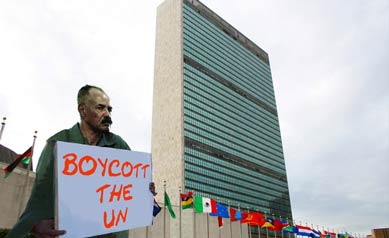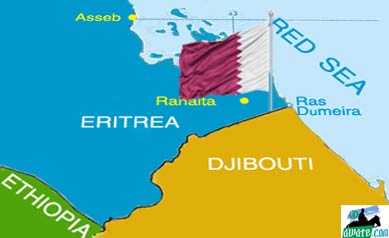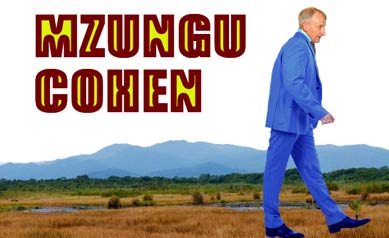June in Geneva: The Next Political Battle

Mike Smith, Chairman of the Commission of Inquiry on Human Rights in Eritrea, previewed his case against members of the Government of Eritrea by reading a statement supporting the Commission’s case that Eritrean officials are guilty of crimes against humanity. This was followed by a rebuttal from Yemane Gebreab, Director of Political Affairs of Eritrea’s ruling party, PFDJ, who is also a Presidential Advisor. Both took questions from reporters gathered at the Human Rights Council (HRC) headquarters in Geneva.
We will have an opportunity to discuss the merits of the case when the dossier CoIE has prepared is presented to the Human Rights Council when it meets between June 13 and July 1st. For now, my observations:
1. Crimes Against Humanity is Article 7 of the Rome Statute of the International Criminal Court. This article was a product of the post-Yugoslavia and post-Rwanda era and it defines “crimes against humanity” as (a) Murder; (b) Extermination; (c) Enslavement; (d) Deportation or forcible transfer of population; (e) Imprisonment or other severe deprivation of physical liberty in violation of fundamental rules of international law; (f) Torture; (g) Rape, sexual slavery, enforced prostitution, forced pregnancy, enforced sterilization, or any other form of sexual violence of comparable gravity; (h) Persecution against any identifiable group or collectivity on political, racial, national, ethnic, cultural, religious, gender… or other grounds that are universally recognized as impermissible under international law, in connection with any act referred to in this paragraph or any crime within the jurisdiction of the Court; (i) Enforced disappearance of persons; (j) The crime of apartheid; (k) Other inhumane acts of a similar character intentionally causing great suffering, or serious injury to body or to mental or physical health when committed as part of a widespread or systematic attack directed against any civilian population, with knowledge of the attack.
2. In other words, the Commission has to make the case that not only is the Government of Eritrea responsible for all these crimes but that the crimes are also part of “widespread or systematic attack.” And once the officials of the Government of Eritrea get off their moral outrage and cede the ground to the lawyers, their defense rests on denying that the crimes happened and, if that fails, that they happened but were not “widespread or systematic” but random, anecdotal and not premeditated.
3. One of the great things about being older and having no insecurities about your career is that you tend to be fearless. This is the case with Mike Smith, a man with a long career in diplomacy, and a senior who unlike, say, the members of the United Nations Monitoring Group on Somalia and Eritrea, doesn’t live in fear that his mandate will end or that he will lose his job, if any one of the many stakeholders are displeased. Given that the entire European Union bureaucracy has embraced its inner weasel and wants the issue to go away so that it can continue its “engagement” with the Government of Isaias Afwerki, its best hope (it thinks) against the hordes of immigrants (when he is actually its root cause), Mr. Smith showed immense fortitude in standing his ground and making his case, damn the torpedoes.
4. I expected the Commission of Inquiry to find officials of the government guilty of crimes against humanity based on enforced disappearances, torture, severe deprivation of liberties, persecution, etc, but I didn’t think that the bulk of the case (at least based on the time he spent on it in his presentation) would be based on “slavery.” This is because I, as he alluded to it, am one of the people who equates “slavery” with its 16th century meaning whereas his Commission–and apparently the rest of the world, including an Eritrean movement called “Stop Slavery” and, crucially, the Rome Statute itself–defines modern slavery differently: “Enslavement” means the exercise of any or all of the powers attaching to the right of ownership over a person and includes the exercise of such power in the course of trafficking in persons, in particular women and children. The Walk Free Foundation (which recently flunked Eritrea on its slavery scale) is even more explicit: it defines modern slavery as “situations where one person has taken away another person’s freedom–their freedom to control their body, their freedom to choose or to refuse certain work or to stop working–so they can be exploited. Freedom is taken away by threats, violence, coercion, abuse of power and deception. The net result is that a person cannot refuse or leave the situation.” This is exactly the situation that members of Eritrea’s “National Service” find themselves in. Using this definition, Mr. Smith’s claim that the 300-400,000 Eritreans who are not civil servants but engaged in indefinite manual labor WHILE they are under military discipline are “modern slaves” is not far-fetched. It’s also tactically clever: proving crimes-against-humanity against civilian leaders who are many steps removed from the brutalities they order is difficult; proving it against military leaders who give and witness the brutalities–in front of many, many, many witnesses now exiled– is easier.
5. In “On The Wings of Malice and Idiocy“, I noted “Observing the government of Eritrea and its functionaries, one is always struck which one of their two wings is heavier: the malicious one or the stupid one?” Despite the fact that all commissions of inquiries (CoI on North Korea; CoI on Syria, etc) hold press conferences before they publish their reports, Eritrea’s Ministry of Information issued not one but two press releases (meltdowns) to describe CoI on Eritrea’s announced press release as “unprecedented.” Despite the fact all UN commissions, monitoring groups use “reasonable grounds to believe” as their standard of evidence, the Government of Eritrea (which has zero evidentiary standards to imprison and torture its citizens) complained bitterly about CoI’s “low” standard of evidence. Despite the fact that nearly all HRC resolutions are “adopted without a vote”, the GoE saw all kinds of shenanigans in the make-up of the Commission of Inquiry, particularly that one member is gasp! also the Special Rapporteur. Despite the fact that it could have gone on a charm offensive and invited the CoI to Eritrea and have them meet the Western diplomatic mission that has “gone native”, it denied them entry to Eritrea. And so on.
6. In keeping with this “maybe late, maybe never” standard operating procedure, the GoE made a last-minute announcement that Yemane Gebreab is coming. In his rebuttal, he was uncharacteristically emotional–specially when reading from his prepared notes and waving the CoIE’s report. But he was sufficiently calm and smiling by the time a reporter asked something like, “How is it the Government knows the precise number of petitions (40,000) that its supporters spontaneously and autonomously sent to the CoIE?” Come on, man, there is no difference between organic grassroots movement and Astroturf movement in Eritrea when we are I and I are we. I even know the precise number of Eritreans who volunteered to present themselves, in person, to the Geneva office. This is not a case of the Diaspora being order-takers, they are partners in nation-building. But that smile just gave it all away: come on, man, don’t do me like that.
7. I wish there was something I could quote from the statement of Yemane Gebreab but what can you quote from a categorical denial of Bart-Simpsonish “I didn’t do it, nobody saw me do it, you can’t prove anything”? Three things actually. One, we now have it from a senior government official that Eritrea’s population is “less than four million.” It takes a foreign journalist for Eritreans to know basic facts like the approximate size of the population. Second, its painful to watch his soul slowly die whenever he is asked questions about the G-15 and the journalists like Dawit Isaac: he gives a word salad, not a single part of which he believes: he just presses play in his head and out comes stuff he doesn’t believe in. Third, and most noteworthy, is about next moves: and therefore it will take up the balance of this article:
8. Yemane Gebreab made a distinction between the 3-individual member Commission of Inquiry; the 50-state-member Human Rights Council, and the 15-states member Security Council. He was arguing that the CoIE report represents the views of 3 individuals and several years ago, it would have been rubber-stamped by HRC and then UN but not anymore. He strongly hinted that it won’t make it past HRC. Well. Well, well, well.
9. This could mean one of two things. One: it is the usual bluff of PFDJ (every year for 15 years it is: “for once and for all, this year, we have resolutely rebuffed our enemies…”) Or, Yemane Gebreab has counted the votes and is very confident that a coalition of Africans, Asians, South Americans and a new Amen Corner in Europe will sabotage the CoIE. Or, Europe being Europe, they will vote for it and then do everything in their power to dilute and kill it. So, roll call:
| HRC MEMBER STATES | ||
|---|---|---|
| County | Block | Will they vote to refer Isaias & Co to ICC? |
| Algeria | Africa | Big fan of African Peace & Security Council. No to ICC, yes to AU. |
| Botswana | Africa | Strong advocate of ICC |
| Burundi | Africa | Not a big fan of ICC |
| Congo | Africa | Not a big fan of ICC, but essentially a French republic |
| Cote d’Ivoire | Africa | See also: France |
| Ethiopia | Africa | Not a signatory of ICC but, come on. |
| Ghana | Africa | Made big noise against CoI and for Universal Periodic Review |
| Kenya | Africa | Generally a US ally but Uhuru hates ICC (pending case) |
| Morocco | Africa | Not happy with UN and AU over recognition of Western Sahara |
| Namibia | Africa | Big fan of ICC |
| Nigeria | Africa | Big fan of ICC |
| South Africa | Africa | Hates ICC & wants Africa to walk out of ICC–sneaked Albashir |
| Togo | Africa | No clue |
| Bolivia | Latin America | All South Americans signed and ratified Rome Statute. But, left-wingers… |
| Cuba | Latin America | A big, fat, no |
| Ecuador | Latin America | All South Americans signed and ratified Rome Statute. But, left-wingers… |
| El Salvador | Latin America | All South Americans signed and ratified Rome Statute. But, left-wingers… |
| Mexico | Latin America | All South Americans signed and ratified Rome Statue. |
| Panama | Latin America | All South Americans signed and ratified Rome Statute. |
| Paraguay | Latin America | All South Americans signed and ratified Rome Statute |
| Venezuela | Latin America | “Bolivarian Republic.” Need I say more? No. |
| Bangladesh | Asia-Pacific | Probably no |
| China | Asia Pacific | Definitely no. |
| India | Asia Pacific | Probably no. India (and US) tried to kill the Rome Statute when it was being drafted. |
| Indonesia | Asia Pacific | No |
| Krgyzstan | Asia Pacific | No |
| Maldives | Asia Pacific | Yes. Tiny Maldives has same vote as China. Just sayin’ |
| Mongolia | Asia Pacific | Yes |
| Phillipines | Asia Pacific | Yes |
| Qatar | Asia Pacific | Definitely no. Can you say “Islamic Coalition Against Terror”? |
| Korea | Asia Pacific | Psyche! I am talking about South Korea. So, yes. |
| Saudi Arabia | Asia Pacific | Definitely, absolutely, no. |
| UAE | Asia Pacific | Even more definite and absolute NO than Saudi Arabia. |
| Viet Nam | Asia Pacific | No. |
| Belgium | Western Europe | Yes (in theory) |
| France | Western Europe | Yes |
| Germany | Western Europe | Yes (but largest host of Eritrean migrants, so…) |
| Netherland | Western Europe | Yes, but see Germany. |
| Portugal | Western Europe | Yes. |
| Switzerland | Western Europe | Yes, because it hosts HRC. And last visit to Eritrea was dismal. |
| United Kingdom | Western Europe | Yes (in theory.) But there is oil, mineral interests… |
| Northern Ireland | Western Europe | Yes. One of the last holdouts of liberalism. |
| Albania | Eastern Europe | Yes. Familiar with crimes against humanity. |
| Georgia | Eastern Europe | Yes. |
| Latvia | Eastern Europe | Yes. Latvia is more Western than Western Europe. |
| Russian Federation | Eastern Europe | No. Thank you for recognizing Crimea as Russian, comrade Isaias Afwerki. |
| Slovenia | Eastern Europe | Yes. Like Latvia, more Western than Western Europe. |
| Macedonia | Eastern Europe | Clue: Former Yugoslav Republic. So, Yes. |
So: how many yes, how many no, how many maybe in the list above? You answer that question and you have your answer to whether Yemane Gebreab is practicing a deeply-held PFDJ value of empty-gereweinasm or if his government has done its homework or, more importantly, it is about to begin phase 2 of its “spontaneous popular uprising” (wink) of having the Astroturf constituency calling, faxing forms they didn’t read, lobbying the member states of HRC.
When one’s self-identity is deeply intertwined with one’s ability to overcome hardship, it is inevitable that one will be constantly creating hardships. It is the political version of the Houdini act. The tragedy is that our political Houdinis never placed themselves in danger; it was always the people. Now their only way out is not their political skill but something else that is deeply-entrenched in European self-identity: the ability to be charmed by tyrants.
With its description of the crimes in Eritrea as “systematic, widespread and gross”, the Commission of Inquiry tipped its hand last year that it thinks crimes against humanity have been and are being committed in Eritrea, and the UN mandated it to investigate if that is the case with a “view to full accountability.” It acted on its mandate and it will report its findings. Europe’s back, unless it is stiffened by the United States, is giving every indication that it will go wobbly. One hopes they remember the words of Simon Wiesenthal: “Justice for crimes against humanity must have no limitations.”
We shall see. Meanwhile, I wish the best of luck to all our compatriots who are demonstrating on June 23rd in Geneva and unlike you-know-who, they were not cajoled, coerced, blackmailed to do it. Damn, it feels good to be free. Regardless of the outcome, what matters most is that you are standing up for the imprisoned, the disappeared, the exiled even as the Western journalists and European diplomats are going wobbly. It’s Ramadan so one of my favorite sayings from the Hadith:



Awate Forum